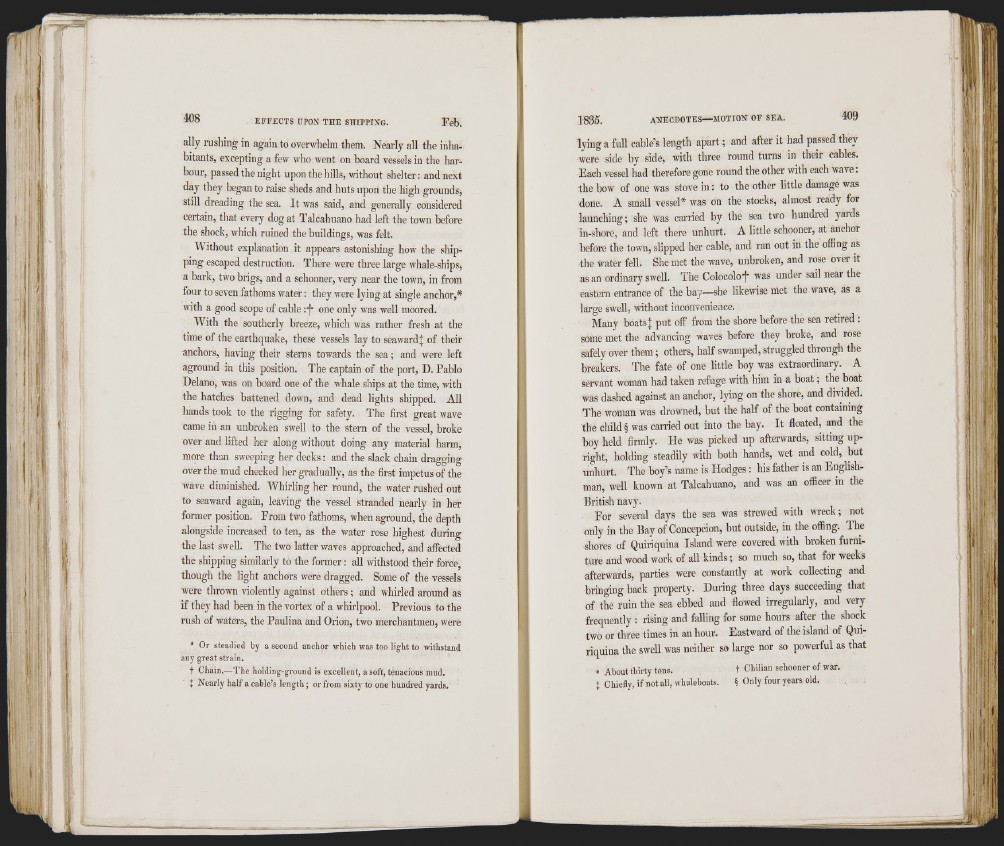
(i I
Feb.
ally rushing in again to overwhelm them. Nearly all the inhabitants,
excepting a few who went on board vessels in the harbour,
passed the night upon the hills, without shelter: and next
day they began to raise sheds and huts upon the high grounds,
still dreading the sea. It was said, and generally considered
certain, that every dog at Talcahuano had left the town before
the shock, which ruined the buildings, was felt.
Without explanation it appears astonishing how the shipping
escaped destruction. There were three large whale-ships,
a bark, two brigs, and a schooner, very near the town, in from
four to seven fathoms water; they were lying at single anchor,*
with a good scope of cable one only was well moored.
With the southerly breeze, which was rather fresh at the
time of the earthquake, these vessels lay to seaward] of their
anchors, having their sterns towards the sea; and were left
aground in this position. 7'he captain of the port, D. Pablo
Delano, was on board one of the whale ships at the time, with
the hatches battened down, and dead lights shipped. All
hands took to the rigging for safety. The first great wave
came in an unbroken swell to the stern of the vessel, broke
over and lifted her along without doing any material harm,
more than sweeping her decks: and the slack chain dragging
over the mud checked her gradually, as the first impetus of the
w'ave diminished. AVhirling her round, the water rushed out
to seaward again, leaving the vessel stranded nearly in her
former position. From two fathoms, when aground, the depth
alongside increased to ten, as the water rose highest during
the last swell. The two latter waves approached, and affected
the shipping similarly to the former: all withstood their force,
though the light anchors were dragged. Some of the vessels
were thrown violently against others ; and whirled around as
if they had been in the vortex of a whirlpool. Previous to the
rush of waters, the Paulina and Orion, two merchantmen, were
* Or steadied by a second anchor wbicb was too light to withstand
any great strain.
t Chain.—The holding-ground is excellent, a soft, tenacious mud.
I Nearly half a cable’s length ; or from sixty to one hundred yards.
lying a full cable’s length apart; and after it had passed they
were side by side, with three round turns in their cables.
Each vessel had therefore gone round the other with each wave:
the how of one was stove in : to the other little damage was
done. A small vessel* was on the stocks, almost ready for
launching; she was carried by the sea two hundred yards
in-shore, and left there unhurt. A little schooner, at anchor
before the town, slipped her cable, and ran out in the oiling as
the water fell. She met the wave, unbroken, and rose over it
as an ordinary swell. The Colocolo! was under sail near the
eastern entrance of the bay—she likewise met the wave, as a
large swell, without incon'venience.
Many hoats] put off from the shore before the sea retired :
some met the advancing waves before they broke, and rose
safely over them; others, half swamped, struggled through the
breakers. The fate of one little boy was extraordinary. A
servant woman had taken refuge with him in a boat; the boat
was dashed against an anchor, lying on the shore, and divided.
The woman was drowned, but the half of the boat containing
the child § was carried out into the bay. It floated, and the
hoy held firmly. He was picked up afterwards, sitting upright,
holding steadily with both hands, wet and cold, but
unhurt. The boy’s name is Hodges : his father is an Englishman,
well known at Talcahuano, and was an ofiicer in the
British navy.
For several days the sea was strewed with wreck; not
only in the Bay of Concepcion, but outside, in the offing. The
shores of Quiriquina Island were covered with broken furniture
and wood work of all kinds; so much so, that for weeks
afterwards, parties were constantly at work collecting and
bringing back property. During three days succeeding that
of the ruin the sea ebbed and flowed irregularly, and very
frequently : rising and falling for some hours after the shock
two or three times in an hour. Eastward of the island of Quiriquina
the sweU was neither so large nor so powerful as that
» About tliirty tons.
{ Chiefly, if notali, whaleboats.
f Chilian schooner of war.
§ Only four years old.
I / n
s i B ' i